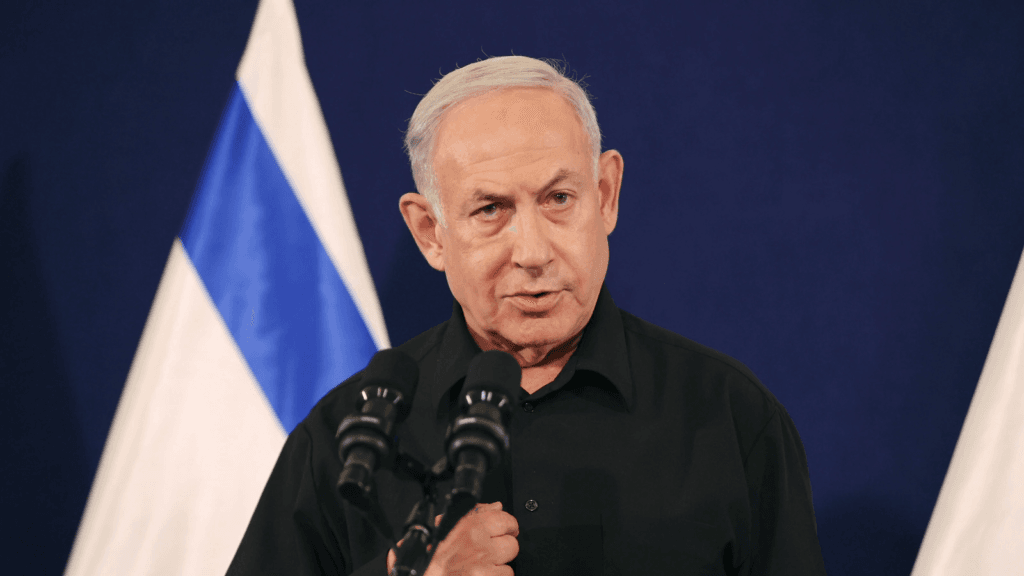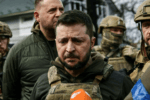Israel’s Prime Minister, Benjamin Netanyahu, discussed his intentions for Gaza during the continuing conflict in a television speech on September 2. This occurred subsequent to an attack on October 7 in Israel by the Palestinian organization Hamas, which claimed 1,139 lives and kidnapped about 250 more. Israel responded by launching a military assault in Gaza that has claimed the lives of over 40,000 Palestinians.
Netanyahu has been under increasing internal and external pressure to accept a ceasefire. Under the planned arrangement, Palestinian detainees would be released in exchange for a truce and the release of Israeli inmates. Netanyahu, however, made it plain in his televised speech that he had no intention of accepting a ceasefire anytime soon. Rather, he presented a comprehensive strategy for Gaza’s future.
What Was Netanyahu’s Presentation About?
Netanyahu was shown on television standing in front of a huge map. This map represented Gaza with drawings of bombs and masked people. Although the presentation’s goal was to outline his vision for Gaza, one significant detail stuck out: the map did not include the West Bank, which is Israeli-occupied Palestinian territory.
What Does Netanyahu Want to Do to Gaza?

According to Netanyahu’s plan, the northern portion of Gaza, which is located above the Netzarim Corridor, will remain totally demolished. According to him, this was required to enable Israeli forces to destroy tunnels and Hamas activities in that region. To put it another way, the people who had lived there would not be let to return, and this portion of Gaza would not be rebuilt.
Keeping control of the Philadelphi Corridor, a slender stretch of land in southern Gaza that borders Egypt, is another crucial component of his strategy. Netanyahu wants to make sure that Israel maintains its long-standing dominance over this region. Between Rafah and Khan Younis, a third corridor would likewise be built and maintained under Israeli administration.
Netanyahu, nevertheless, believes that Israel should not be in charge of the two million Palestinians who have been forced to flee their homes due to the fighting. Rather, he proposed that civilian matters be overseen by a municipal government.
What About the West Bank?

The most unexpected aspect of Netanyahu’s speech was how his plan for Gaza entirely ignored the West Bank, a crucial area in the Israeli-Palestinian conflict. In spite of the reality that the West Bank is still a major source of conflict, the map he displayed appeared to indicate that it had been fully incorporated into Israel.
Israeli forces have been conducting more operations in the West Bank in the meantime, particularly in Palestinian villages and refugee camps. This has caused many commentators to speculate that Netanyahu’s ultimate objective may be to seize complete control of the West Bank.
Why Focus on the Philadelphi Corridor?
Netanyahu’s proposal includes the Philadelphi Corridor, a slender stretch along the border between Egypt and Gaza, as one of its main components. Netanyahu contends that maintaining authority over this region is crucial to Israel’s security. According to him, only Israel is able to stop Hamas from transporting either people or weapons across the border.
Analysts surmise that there may be a different motivation behind this emphasis. Tel Aviv’s focus on the Philadelphia Corridor appears to be impeding peace negotiations. The conflict’s principal mediator, Egypt, is against Israeli ownership of this passage. It’s possible that Netanyahu is attempting to thwart a ceasefire agreement by focusing on this issue.
Why Would Netanyahu Want to Block a Ceasefire?
This is a crucial query. Many are startled by Netanyahu’s refusal to consent to a ceasefire in the face of increasing pressure. According to some analysts, Netanyahu wants to draw out the conflict. He might be attempting to prolong his reign of power and evade facing accusations of corruption by taking this action.
The hostages taken by Hamas on October 7 are unlikely to be freed anytime soon in the absence of a ceasefire. Many Israelis are upset about this, and there have been sizable demonstrations calling for their release. Netanyahu seems committed to carrying out his war plans for Gaza despite the popular outrage.
Will Israeli Troops Stay in Gaza?
Netanyahu’s strategy calls for the continued presence of Israeli military in Gaza. Both the Philadelphi Corridor, which runs along the border with Egypt, and the Netzarim Corridor, which splits Gaza into its northern and southern halves, will remain under their control.
According to this approach, the suffering of people on both sides is likely to endure, and the conflict in Gaza is far from done.
Conclusion
A strategy centered on retaining control of strategic locations, like as the Netzarim and Philadelphi Corridors, is evident in Netanyahu’s plan and blueprint for Gaza. His strategy makes it seem unlikely that he will rebuild or let residents go back to their houses. Furthermore, his strategy suggests annexation as a long-term objective rather than dealing with the occupied West Bank. Netanyahu appears to be buying time by delaying ceasefire talks, maybe for his own political benefit. Ultimately, there is still uncertainty about Gaza’s future and the fate of those impacted by this conflict.
FAQs
1. What is Netanyahu’s plan for Gaza?
Netanyahu’s plan involves destroying and controlling key areas in northern Gaza and along the border with Egypt. He wants to prevent civilians from returning to these areas.
2. Why is Netanyahu focused on the Philadelphi Corridor?
Netanyahu claims this area is important for Israel’s security, but some believe his focus on it is delaying ceasefire talks.
3. Will there be a ceasefire?
At the moment, Netanyahu has shown no intention of agreeing to a ceasefire, despite international and internal pressure.
4. What does the plan say about the West Bank?
Netanyahu’s plan did not include the West Bank, but his actions suggest he may be aiming to annex it completely into Israel.
5. Why is there pressure on Netanyahu?
Many Israelis are protesting, demanding the release of captives taken by Hamas. Additionally, Netanyahu is facing corruption charges and may be using the war to stay in power.














